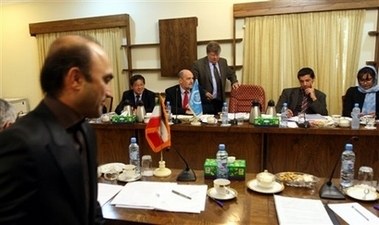Iran, IAEA tackle centrifuge questions
Updated: 2007-10-30 14:57
TEHRAN, Iran -- Iranian and UN nuclear watchdog officials began a third, final round of talks in Tehran on Monday aimed at resolving remaining questions on centrifuges that are used to enrich uranium.
|
|
The Tehran talks are critical because they will provide the basis for a progress report on Iran by the UN agency's chief, Mohamed ElBaradei, planned for mid-November.
"In this new round of talks, we hope we'll be able to conclude our negotiations," Iranian state television quoted Mohammad Saeedi, deputy head of the country's Atomic Energy Organization, as saying.
The discussions are the latest attempt by the Vienna, Austria-based International Atomic Energy Agency to address outstanding questions on the Iranian program, which the United States and some other Western countries believe masks nuclear weapons production. Iran insists its nuclear program is for peaceful energy production.
The IAEA's deputy chief, Olli Heinonen, heads the UN delegation, while Iran's is headed by Javad Vaeedi from the Supreme National Security Council, a security decision-making body that handles Iran's nuclear talks with the outside world.
Saeedi said the two previous rounds of talks with the IAEA were "comprehensive" and also "frank and explicit," and that Tehran was now prepared to answer remaining questions to "close the file" on its centrifuge technology.
Heinonen said Iran has had "good cooperation" with the UN agency in clearing up ambiguities over Tehran's P-1 and P-2 centrifuge technology.
Neither official provided details.
Centrifuges are used in enriching uranium, a process that can produce either fuel for a nuclear reactor or the material for a warhead. P-2 centrifuges are more sophisticated, consume less electricity and produce more enriched uranium than their predecessors, the P-1 centrifuges.
Iran says its centrifuges are the P-1 type, not the more advanced P-2. However, it has confirmed that it has conducted laboratory research on the advanced P-2 centrifuge.
In its report on the Tehran talks, state radio said Iran's cooperation with the IAEA represented "new steps toward building confidence" and would also undermine efforts by the United States and its allies to impose new UN sanctions against Tehran.
In September, ElBaradei praised Iran's cooperation with the agency so far, but urged Tehran to answer all questions -- including those on reported experiments that link enrichment and missile technology -- before the end of the year.
In speaking to the UN General Assembly on Monday, he stressed that "Iran's cooperation and transparency are key" to his report on Iran's nuclear program.
"These verification issues have been at the core of the lack of confidence about the nature of Iran's program," ElBaradei said.
|
|
|
||
|
||
|
|
|
|


